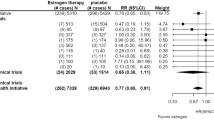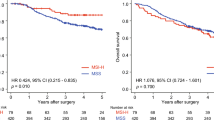Abstract
Introduction
To investigate whether microsatellite instability (MSI) is an important prognostic biomarker for endometrioid endometrial cancer (EEC).
Methods
The PubMed, EMBASE, and the Cochrane Cooperative Library databases were searched from inception to July 2021. Overall survival, disease-free survival, progression-free survival, EEC-specific survival, recurrence-free survival, and the recurrence rate were pooled to analyze the correlation between MSI and EEC. In addition, Egger’s regression analysis and Begg’s test were used to detect publication bias.
Results
17 studies met the inclusion criteria and were included in our meta-analysis with a sample size of 4723, and the included patients with endometrioid cancer (EC) all were EEC. The pooled hazard ratios (HR) in patients with EEC showed that MSI was significantly associated with shorter overall survival [HR = 1.37, 95% confidence interval (CI) (1.00–1.86), p = 0.048, I2 = 60.6%], shorter disease-free survival [HR = 1.99, 95% CI (1.31–3.01), p = 0.000, I2 = 67.2%], shorter EEC-specific survival [HR = 2.07, 95% CI (1.35–3.18), p = 0.001, I2 = 31.6%] and a higher recurrence rate [Odds ratios (OR) = 2.72, 95% CI (1.56–4.76), p = 0.000, I2 = 0.0%]. In the early-stage EEC subgroup, MSI was significantly associated with shorter overall survival [HR = 1.47, 95% CI (1.11–1.95), p = 0.07], shorter disease-free survival [HR = 4.17, 95% CI (2.37–7.41), p = 0.000], and shorter progression-free survival [HR = 2.41, 95% CI (1.05–5.54), p = 0.039]. No significant heterogeneity was observed in overall survival (I2 = 20.9%), disease-free survival (I2 = 0.0%), or progression-free survival (I2 = 0.0%) in patients with early-stage EEC. Meanwhile, publication bias was not observed, and the p-value for Egger’s test of overall survival, disease-free survival, and EEC-specific survival were p = 0.131, p = 0.068, and p = 0.987, respectively.
Conclusion
MSI is likely an important biomarker for poor prognosis in patients with EEC, and this correlation is even more certain in patients with early-stage EEC.



Similar content being viewed by others
References
Siegel RL, Miller KD, Jemal A (2019) Cancer statistics, 2019. CA Cancer J Clin 69(1):7–34
Siegel RL, Miller KD, Jemal A (2020) Cancer statistics, 2020. CA Cancer J Clin 70(1):7–30
Rutgers JK (2015) Update on pathology, staging and molecular pathology of endometrial (uterine corpus) adenocarcinoma. Future Oncol 11(23):3207–3218
Soreide K, Janssen EA, Soiland H et al (2006) Microsatellite instability in colorectal cancer. Br J Surg 93(4):395–406
Akagi K, Oki E, Taniguchi H et al (2021) The real-world data on microsatellite instability status in various unresectable or metastatic solid tumors. Cancer Sci 112(3):1105–1113
Black D, Soslow RA, Levine DA et al (2006) Clinicopathologic significance of defective DNA mismatch repair in endometrial carcinoma. J Clin Oncol 24(11):1745–1753
Mackay HJ, Gallinger S, Tsao MS et al (2010) Prognostic value of microsatellite instability (MSI) and PTEN expression in women with endometrial cancer: results from studies of the NCIC Clinical Trials Group (NCIC CTG). Eur J Cancer 46(8):1365–1373
Steinbakk A, Malpica A, Slewa A et al (2011) Biomarkers and microsatellite instability analysis of curettings can predict the behavior of FIGO stage I endometrial endometrioid adenocarcinoma. Mod Pathol 24(9):1262–1271
Diaz-Padilla I, Romero N, Amir E et al (2013) Mismatch repair status and clinical outcome in endometrial cancer: a systematic review and meta-analysis. Crit Rev Oncol Hematol 88(1):154–167
Kim SR, Pina A, Albert A et al (2018) Does MMR status in endometrial cancer influence response to adjuvant therapy? Gynecol Oncol 151(1):76–81
Ruz-Caracuel I, Ramon-Patino JL, Lopez-Janeiro A et al (2019) Myoinvasive pattern as a prognostic marker in low-grade, early-stage endometrioid endometrial carcinoma. Cancers 11(12):1845
Moher D, Liberati A, Tetzlaff J et al (2009) Preferred reporting items for systematic reviews and meta-analyses: the PRISMA statement. J Clin Epidemiol 62(10):1006–1012
Nout RA, Bosse T, Creutzberg CL et al (2012) Improved risk assessment of endometrial cancer by combined analysis of MSI, PI3K-AKT, Wnt/beta-catenin and P53 pathway activation. Gynecol Oncol 126(3):466–473
Kim SR, Pina A, Albert A et al (2020) Mismatch repair deficiency and prognostic significance in patients with low-risk endometrioid endometrial cancers. Int J Gynecol Cancer 30(6):783–788
Fiumicino S, Ercoli A, Ferrandina G et al (2001) Microsatellite instability is an independent indicator of recurrence in sporadic stage I–II endometrial adenocarcinoma. J Clin Oncol 19(4):1008–1014
Maxwell GL, Risinger JI, Alvarez AA et al (2001) Favorable survival associated with microsatellite instability in endometrioid endometrial cancers. Obstet Gynecol 97(3):417–422
Zighelboim I, Goodfellow PJ, Gao F et al (2007) Microsatellite instability and epigenetic inactivation of MLH1 and outcome of patients with endometrial carcinomas of the endometrioid type. J Clin Oncol 25(15):2042–2048
Bilbao C, Lara PC, Ramirez R et al (2010) Microsatellite instability predicts clinical outcome in radiation-treated endometrioid endometrial cancer. Int J Radiat Oncol Biol Phys 76(1):9–13
Zighelboim I, Ali S, Lankes HA et al (2015) Assessing the prognostic role of ATR mutation in endometrioid endometrial cancer: An NRG Oncology/Gynecologic Oncology Group study. Gynecol Oncol 138(3):614–619
Stang A (2010) Critical evaluation of the Newcastle-Ottawa scale for the assessment of the quality of nonrandomized studies in meta-analyses. Eur J Epidemiol 25(9):603–605
Bilbao-Sieyro C, Ramirez R, Rodriguez-Gonzalez G et al (2014) Microsatellite instability and ploidy status define three categories with distinctive prognostic impact in endometrioid endometrial cancer. Oncotarget 5(15):6206–6217
Ruiz I, Martin-Arruti M, Lopez-Lopez E et al (2014) Lack of association between deficient mismatch repair expression and outcome in endometrial carcinomas of the endometrioid type. Gynecol Oncol 134(1):20–23
McMeekin DS, Tritchler DL, Cohn DE et al (2016) Clinicopathologic significance of mismatch repair defects in endometrial cancer: an NRG oncology/gynecologic oncology group study. J Clin Oncol 34(25):3062–3068
Bosse T, Nout RA, McAlpine JN et al (2018) Molecular classification of grade 3 endometrioid endometrial cancers identifies distinct prognostic subgroups. Am J Surg Pathol 42(5):561–568
Kim J, Kong JK, Yang W et al (2018) DNA mismatch repair protein immunohistochemistry and MLH1 promotor methylation testing for practical molecular classification and the prediction of prognosis in endometrial cancer. Cancers 10(9):279
Nagle CM, O’Mara TA, Tan Y et al (2018) Endometrial cancer risk and survival by tumor MMR status. J Gynecol Oncol 29(3):e39
Backes FJ, Haag J, Cosgrove CM et al (2019) Mismatch repair deficiency identifies patients with high-intermediate-risk (HIR) endometrioid endometrial cancer at the highest risk of recurrence: a prognostic biomarker. Cancer 125(3):398–405
Bendifallah S, Canlorbe G, Collinet P et al (2015) Just how accurate are the major risk stratification systems for early-stage endometrial cancer? Br J Cancer 112(5):793–801
Travaglino A, Raffone A, Mollo A, Borrelli G, Alfano P, Zannoni GF et al (2020) TCGA molecular subgroups and FIGO grade in endometrial endometrioid carcinoma. Arch Gynecol Obstet 301(5):1117–1125
McMeekin DS, Tritchler DL, Cohn DE, Mutch DG, Lankes HA, Geller MA et al (2016) Clinicopathologic significance of mismatch repair defects in endometrial cancer: an NRG oncology/gynecologic oncology group study. J Clin Oncol 34(25):3062–3068
Kim SR, Tone A, Kim RH, Cesari M, Clarke BA, Eiriksson L et al (2021) Understanding the clinical implication of mismatch repair deficiency in endometrioid endometrial cancer through a prospective study. Gynecol Oncol 161(1):221–227
Concin N, Matias-Guiu X, Vergote I, Cibula D, Mirza MR, Marnitz S et al (2021) ESGO/ESTRO/ESP guidelines for the management of patients with endometrial carcinoma. Int J Gynecol Cancer 31(1):12–39
Raffone A, Travaglino A, Raimondo D, Neola D, Maletta M, Santoro A et al (2022) Lymphovascular space invasion in endometrial carcinoma: a prognostic factor independent from molecular signature. Gynecol Oncol 165(1):192–197
Travaglino A, Raffone A, Stradella C, Esposito R, Moretta P, Gallo C et al (2020) Impact of endometrial carcinoma histotype on the prognostic value of the TCGA molecular subgroups. Arch Gynecol Obstet 301(6):1355–1363
Raffone A, Travaglino A, Raimondo D, Neola D, Renzulli F, Santoro A et al (2021) Prognostic value of myometrial invasion and TCGA groups of endometrial carcinoma. Gynecol Oncol 162(2):401–406
Pasanen A, Loukovaara M, Butzow R (2020) Clinicopathological significance of deficient DNA mismatch repair and MLH1 promoter methylation in endometrioid endometrial carcinoma. Mod Pathol 33(7):1443–1452
Acknowledgements
With thanks to all participants in this study.
Funding
The authors have not declared a specific grant for this research from any funding agency in the public, commercial or not-for-profit sectors.
Author information
Authors and Affiliations
Contributions
JPX and YZW designed the study and wrote the manuscript. YYZ and JD developed the search strategy and completed the literature search. JSW developed the inclusion and exclusion criteria for the eligible studies. JPX, YZW, and JSW reviewed the eligible studies and extracted the data. JPX and YYZ did the methodological judgement. YYZ and JD performed the statistical analysis methods. JPX, YZW, and JD summarized the original data. Contributions to the interpretation of the data and review of the manuscript were made by all authors.
Corresponding author
Ethics declarations
Conflict of interest
The authors declare no competing interests.
Ethical approval
This article does not contain any studies with human participants or animals performed by any of the authors.
Additional information
Publisher's Note
Springer Nature remains neutral with regard to jurisdictional claims in published maps and institutional affiliations.
Supplementary Information
Below is the link to the electronic supplementary material.
Rights and permissions
About this article
Cite this article
Xiao, Jp., Wang, Js., Zhao, Yy. et al. Microsatellite instability as a marker of prognosis: a systematic review and meta-analysis of endometrioid endometrial cancer survival data. Arch Gynecol Obstet 307, 573–582 (2023). https://doi.org/10.1007/s00404-022-06636-8
Received:
Accepted:
Published:
Issue Date:
DOI: https://doi.org/10.1007/s00404-022-06636-8




